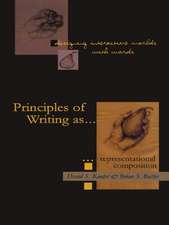The Power of Words: Unveiling the Speaker and Writer's Hidden Craft
Autor David S. Kaufer, Suguru Ishizaki, Brian S. Butler, Jeff Collinsen Limba Engleză Hardback – dec 2003
Over the past several years, David Kaufer and his colleagues have developed a software program for analyzing writing called DocuScope. This book illustrates the concepts and rhetorical theory behind the software analysis, examining patterns in writing and showing writers how their writing works in different categories to accomplish varying objectives. Reflecting the range and variety of audience experience that contiguous words of surface English can prime, the authors present a theory of language as an instrument of rhetorically priming audiences and a catalog of English strings to implement the theory. The project creates a comprehensive map of the speaker and writer's implicit knowledge about predisposing audience experience at the point of utterance.
The book begins with an explanation of why studying language from the standpoint of priming--not just meaning--is vital to non-question begging theories of close reading and to language education in general. The remaining chapters in Part I detail the steps taken to prepare a catalog study of English strings for their properties as priming instruments. Part II describes in detail the catalog of priming categories, including enough examples to help readers see how individual words and strings of English fit into the catalog. The final part describes how the authors have applied the catalog of English strings as priming tools to conduct textual research.
| Toate formatele și edițiile | Preț | Express |
|---|---|---|
| Paperback (1) | 445.77 lei 6-8 săpt. | |
| Taylor & Francis – 16 iul 2015 | 445.77 lei 6-8 săpt. | |
| Hardback (1) | 1001.87 lei 6-8 săpt. | |
| Taylor & Francis – dec 2003 | 1001.87 lei 6-8 săpt. |
Preț: 1001.87 lei
Preț vechi: 1221.79 lei
-18% Nou
Puncte Express: 1503
Preț estimativ în valută:
191.71€ • 205.00$ • 159.84£
191.71€ • 205.00$ • 159.84£
Carte tipărită la comandă
Livrare economică 17 aprilie-01 mai
Preluare comenzi: 021 569.72.76
Specificații
ISBN-13: 9780805847833
ISBN-10: 0805847839
Pagini: 272
Dimensiuni: 152 x 229 x 20 mm
Greutate: 0.5 kg
Ediția:New.
Editura: Taylor & Francis
Colecția Routledge
Locul publicării:Oxford, United Kingdom
ISBN-10: 0805847839
Pagini: 272
Dimensiuni: 152 x 229 x 20 mm
Greutate: 0.5 kg
Ediția:New.
Editura: Taylor & Francis
Colecția Routledge
Locul publicării:Oxford, United Kingdom
Public țintă
ProfessionalCuprins
Contents: T. Oakley, Foreword. Preface. Introduction: Words and Their Potency for Priming Audiences. Part I:Preliminaries. Priming Audience and Practices of Literacy. Cataloging English Strings for Their Priming Potencies: A Report of a Research Study. Methods for Selecting and Catloging Strings. The Catalog Hierarchy. The Hierarchy in Relation to Previous Scholarship. Part II:Results: The Catalog in Depth. Cluster 1: Internal Perspectives. Cluster 2: Relational Perspectives, Part I. Cluster 2: Relational Perspectives, Part II. Cluster 3: External Perspectives. Part III:Implications and Applications of Rhetorical Priming Theory. Using Priming Strings to Analyze Corpora of Texts.
Notă biografică
David S. Kaufer, Suguru Ishizaki, Brian S. Butler, Jeff Collins,




















